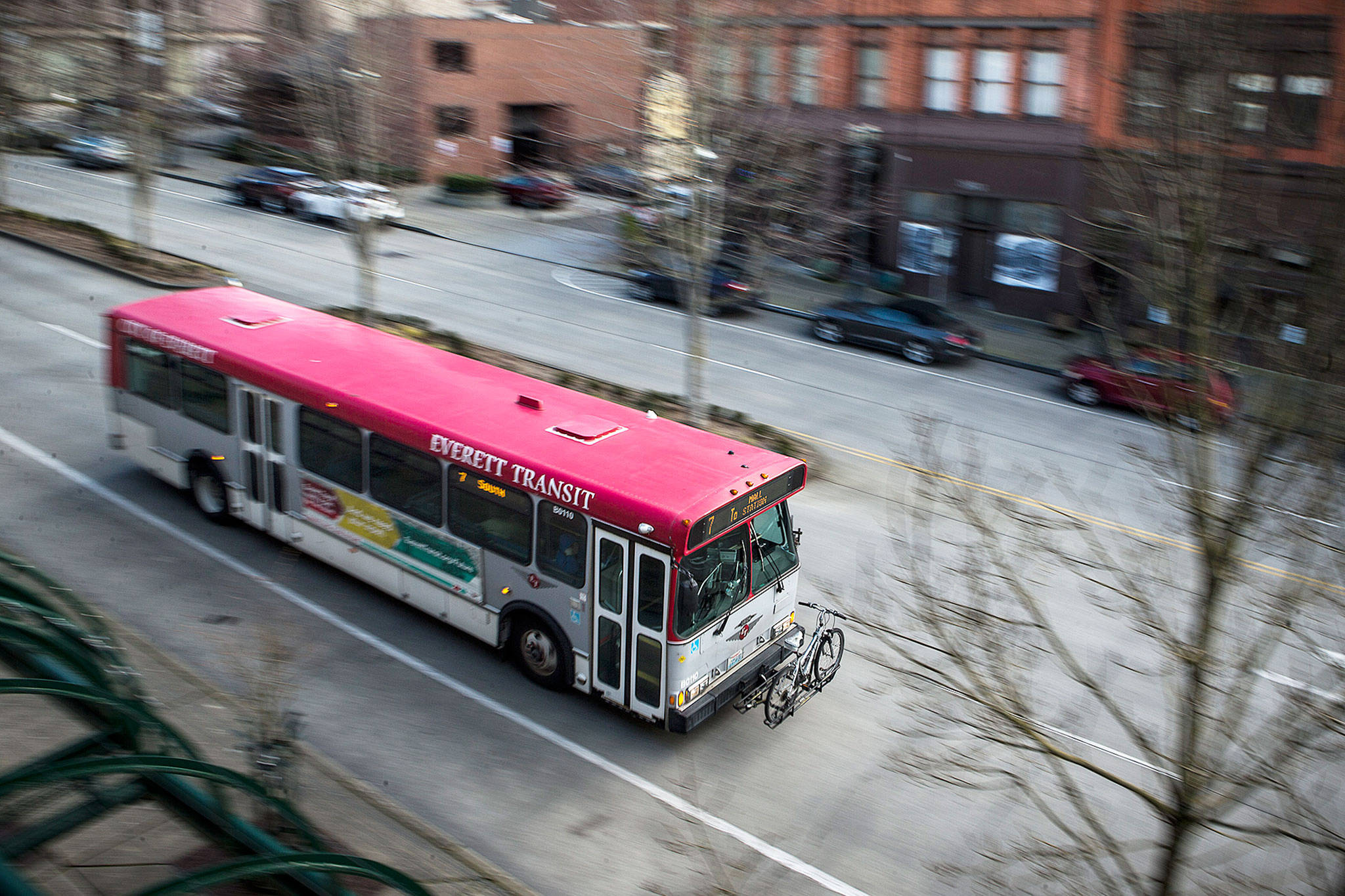By The Herald Editorial Board
The City of Everett is looking to off-load some services and their costs — services that it and other cities have traditionally offered — to resolve a nagging budget deficit that could reach $22.5 million by 2024.
In making future decisions regarding its public library, parks and even fire and emergency aid services, issues of tradition and civic pride are taking a back seat on the bus to questions of cost and continued delivery of service; that’s especially true for Everett Transit, which this year celebrated its 50th anniversary.
An idea kicked around for years — handing over Everett Transit’s fixed route and paratransit services to the countywide Community Transit — got its first official pitch in front of the Everett City Council earlier this month, as The Herald’s Lizz Giordano reported.
“Everett Transit provides a quality service; they just don’t provide enough of it, and it’s not cost-effective,” Emmett Heath, CEO of Community Transit, said after his presentation to the council. “There is an inefficiency in operating two systems.”
Unifying the transit agencies, Heath told the council, would be more efficient, resilient and financially sustainable.
Ultimately, however, the city’s voters are behind the wheel of that decision, one that at its earliest would be on the ballot in the fall of 2021.
And much of that decision will ride on whether voters will approve an increase of the city’s sales tax. Currently, about 80 percent of Everett Transit’s operations are funded through a sales tax of sixth-tenths of 1 percent, or 60 cents on a $100 purchase. Community Transit, however, collects revenue from a 1.2 percent take of the sales tax rate in the regions of the county it serves, twice that of Everett’s rate.
Currently, the sales tax rate in Everett is 9.8 percent. The switch to Community Transit would increase the total sales tax collected in the city to $10.40 on a $100 purchase.
For the merger to go through Everett voters would have to agree to the rate now collected by Community Transit.
Following Heath’s presentation, Steve Oss, president of the union that represents Everett Transit’s drivers, made a fair point to the council.
“If we doubled our revenues through sales tax for Everett Transit we could put a whole lot of transit out there,” Oss told the council.
Oss isn’t the only one with that question.
“I do hope, if they’re going to make this decision to merge Everett Transit with Community Transit, that they consider what Everett Transit would be with same funding level we will be giving Community Transit,” said Tyler Rourke, chairman of the city’s Transportation Advisory Committee, during an interview last week with The Herald Editorial Board. Rourke said he was speaking for himself and not on behalf of the committee.
The other side of the question, Rourke said, is whether Community Transit would deliver the same level of service within Everett that the city’s own transit agency currently delivers.
The proposal also comes a year after the city had undergone considerable expense and time of its staff and the Transportation Advisory Committee — as well as public comment — in developing a long-range plan for Everett Transit that was intended to guide decisions regarding the agency for the next 20 years.
That study recommended a range of changes of services and revenue intended to stem Everett Transit from “bleeding red ink” that could reach $1.6 million by next year.
Among suggestions for efficiencies and revenue, the plan recommended going to the voters for a three-tenths of 1 percent increase in the sales tax, increasing the agency’s sales tax rate by half. Other recommendations included ending service on Sundays and other route and frequency changes. Last year, Everett Transit dropped its lowest-ridership route and now operates 10 routes throughout the city.
Community Transit is a success story for local transportation. In operation for more than 40 years, Community Transit has grown from seven routes with 18 buses to serving nearly all communities in Snohomish County and more than 540,000 of the county’s 800,000 residents. Its ridership, largely on the strength of its Swift Blue and Green express line service, exceeded 10 million boardings in 2016 and is expected to increase to more than 13 million annually by 2022.
But its service differs from that of Everett Transit. Where Community Transit has focused successfully on fixed routes that deliver riders among population centers and other transportation connections, Everett Transit has concentrated on bus routes that serve the city’s neighborhoods.
If that level of service is important to those who rely on buses and those who want them available as an alternative to single-occupancy vehicles, that need will have to be communicated to whichever agency is offering transit in Everett.
The best way to continue Everett Transit’s 50-year legacy of public transit in the city could be in turning over its management to Community Transit, but that’s a decision that will require consultation of the recently completed long-range plan and its recommendation and more discussion among riders and taxpayers about the level of service that is needed and can be provided.
Talk to us
> Give us your news tips.
> Send us a letter to the editor.
> More Herald contact information.

























